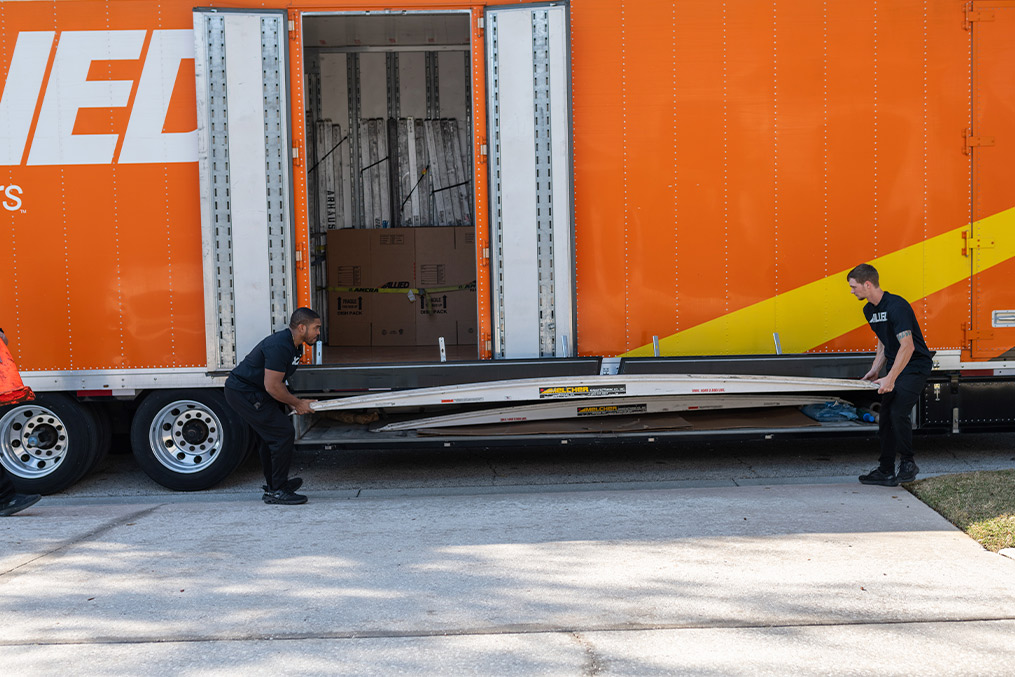Relocating from California to Dubai: Middle East Guide
Nov 11, 2025

For many Californians, the decision to move to Dubai is as exciting as it is transformative. After all, you’re trading the laid-back beaches of the Pacific for a city that glitters with ambition, innovation, and desert luxury. Dubai’s magnetic appeal, from its zero-income-tax policy to its futuristic skyline, has drawn tens of thousands of Americans to start anew in the Middle East.
But what does it really take to relocate from California to Dubai? Beyond the dream of sunshine and skyscrapers lies the practical side: paperwork, movers, visas, customs, housing, and cultural adaptation. This comprehensive California to Dubai guide unpacks it all, blending practical logistics with real-world insights to help Californians make the transition confidently and comfortably.
Why Californians Are Moving to Dubai
The motivations are clear. For professionals and families alike, Dubai offers a compelling escape from California’s soaring taxes and rising cost of living. With zero personal income tax, a thriving international job market, and unmatched safety, the emirate promises both financial and lifestyle upgrades.
Dubai’s global mindset is another draw. With English widely spoken and a strong expat infrastructure, the transition is surprisingly smooth. The city feels international yet welcoming, a crossroads where ambition meets opportunity. And while Los Angeles may have Hollywood glamour, Dubai has its own kind of sparkle, the one built on innovation, efficiency, and an endless drive to grow.
Preparing to Relocate: The California-to-Dubai Plan

Relocating across continents requires precision and patience. For Californians, planning your move at least six months ahead will save you countless headaches later.
The first step while moving from California to Dubai is choosing an experienced international mover. Choose a moving company that regularly handles U.S.–to–UAE transfers and can manage everything from packing and customs documentation to delivery in Dubai.
Most expats opt for sea freight, which takes about 6–8 weeks from Los Angeles or Oakland to Jebel Ali Port. Air freight is faster but pricier. It is useful for urgent or valuable items.
When preparing your shipment, create a detailed inventory list. UAE customs officials will inspect all imports, so clearly labeling each box helps avoid delays. Used personal items are typically duty-free, but prohibited goods, including alcohol, e-cigarettes, and religious or political materials, should never be shipped.
The Paper Trail: Documentation and Visas
For California expats, document authentication is often the most time-consuming part of the relocation process. You’ll need apostilles from the California Secretary of State for documents such as birth certificates, marriage certificates, and educational degrees. Since 2023, the UAE recognizes apostilles, but certain institutions still request an additional stamp from the UAE Ministry of Foreign Affairs (MOFA). It’s smart to complete both to avoid surprises later.
Depending on your purpose for moving, there are several visa pathways:
- Employment Visa: Issued through a UAE employer.
- Green Visa: For skilled professionals or freelancers with a minimum income threshold.
- Golden Visa: For investors, property owners (AED 2 million+), or exceptional talent.
- Remote Work Visa: For remote employees earning at least USD 3,500 monthly.
Once in Dubai, you’ll undergo a medical fitness test, submit biometrics for your Emirates ID, and have your residency visa stamped (now primarily digital). These steps usually take about a week.
Comparing the Costs: From the Golden State to the City of Gold

Let’s address the big question: how does life in Dubai compare to California when it comes to cost? While housing and schooling can rival U.S. prices, the overall difference is noticeable once you remove income tax from the equation.
| Expense Category | Los Angeles (USD) | Dubai (USD equivalent) |
| Rent (2BR apartment) | $2,750 | $3,000 |
| Utilities (monthly) | $250 (estimated) | $500 (estimated). Reflects usage in a hot climate (AC costs). |
| Gasoline (per gallon) | $5.50 (estimate) | $2.80 (estimate) |
Depending on housing and schooling choices, Dubai can be around 15–20% more affordable than major Californian cities. With no personal income tax, expats generally find that their take-home pay goes much further.
Finding Your New Home in Dubai
Housing is one of the most enjoyable parts of relocation. Dubai’s real estate options are vast and visually stunning.
If you’re drawn to the buzz of city life, Downtown Dubai and Dubai Marina offer sleek apartments overlooking iconic landmarks like the Burj Khalifa. Those craving a quieter, family-oriented community tend to favor Arabian Ranches, Dubai Hills Estate, or Jumeirah Village Circle, where you’ll find leafy villas and international schools nearby.
Most leases are for 12 months, and rent is commonly paid in one to four postdated checks. Every contract must be registered with Ejari, Dubai’s tenancy system, to make it legally valid. Many newcomers spend their first month in a serviced apartment while exploring neighborhoods, a smart move before signing a long-term lease.
Settling In: Banking, Healthcare, and Everyday Basics

Once you’ve secured housing, the next step is setting up your day-to-day essentials.
Opening a bank account is straightforward, though you’ll need your Emirates ID (or application slip), passport, and proof of address. Popular banks such as Emirates NBD, First Abu Dhabi Bank (FAB), and HSBC cater to expats and offer strong online banking options.
Healthcare in Dubai is excellent, modern, private, and highly regulated. Health insurance is mandatory for all residents. Plans vary from basic (around $800 a year) to comprehensive international coverage ($3,000–$5,000). Notable hospitals like American Hospital Dubai, Mediclinic City Hospital, and Cleveland Clinic Abu Dhabi offer care on par with U.S. standards.
And yes, you can drive almost immediately. Californians can exchange their U.S. driver’s license for a UAE one with minimal fuss. Just bring your license, an eye test certificate, and your Emirates ID to the Roads and Transport Authority (RTA).
Life and Work: Thriving in Dubai’s Economy
Dubai’s job market is cosmopolitan and merit-driven. Professionals from California often find their skills in high demand in industries such as technology, finance, marketing, and renewable energy. The city’s economic diversification has made it a hotspot for innovation and entrepreneurship. Its free zones, like Dubai Internet City or Dubai International Financial Centre (DIFC), offer full foreign ownership and zero corporate tax.
For those with an entrepreneurial streak, setting up a business in Dubai is refreshingly efficient. The city has streamlined company formation to a matter of weeks, with dedicated business centers guiding you through every step. It’s little wonder that many Californians move not just for a job, but for a chance to build something new.
Education and Family Life
For families, education quality often tops the relocation checklist, and Dubai delivers. The city’s international schools follow American, British, or IB curricula, meaning your child can continue seamlessly from a Californian classroom to a familiar system abroad.
Institutions such as American School of Dubai, GEMS Dubai American Academy, and Dubai International Academy maintain high academic standards and offer robust extracurricular programs. Tuition varies but typically ranges from $18,000 to $28,000 annually. Because spots fill quickly, begin applications six to twelve months before your move.
Life for families in Dubai is safe, convenient, and child-friendly. Parks, beaches, indoor play centers, and cultural venues like Expo City and the Museum of the Future ensure there’s always something to do, even in the summer months when air-conditioned leisure reigns supreme.
Bringing Pets to Dubai
Begin planning at least two months before your move. Your pet will need a microchip that meets ISO 11784/11785 standards (15-digit, non-encrypted). Make sure the chip number appears on all vaccination and health documents.
Your California veterinarian should also issue:
- A valid rabies vaccination certificate, administered at least 21 days before travel but not older than 12 months.
- A general veterinary health certificate confirming your pet is healthy, parasite-free, and fit to fly.
- Proof of core vaccinations (distemper, parvovirus, leptospirosis for dogs; feline viral rhinotracheitis, calicivirus, and panleukopenia for cats).
Before arrival, apply for a UAE pet import permit through the Ministry of Climate Change and Environment (MOCCAE) website. It’s a straightforward online process and costs roughly AED 200–500 depending on the number of animals. The permit is valid for 30 days, and you’ll need to upload digital copies of:
- Your passport
- Rabies and vaccination certificates
- Microchip details
- Health certificate
Once approved, you’ll receive the permit via email. Print a copy to carry during travel.
Settling Your Pet in Dubai
Dubai offers a surprising number of pet-friendly apartments, cafés, and parks, though rules vary by building. Communities like Jumeirah Village Circle, Dubai Hills, and The Springs are popular among pet owners for their green spaces and walking paths.
Veterinary care is excellent, with clinics such as The Veterinary Hospital Dubai, Modern Vet, and Canadian Veterinary Clinic offering services comparable to California standards. Most vets also assist with renewing vaccination records, and export paperwork should you move again.
- Only two pets per person may be imported under one permit.
- Certain breeds (e.g., Pit Bull Terrier, Rottweiler, and Wolf-dog hybrids) are restricted under UAE law.
- Always carry copies of your import permit, vaccination record, and microchip information during travel.
- Never attempt to bring pets without proper documentation. Fines and re-export costs can be steep.
Cultural Etiquette and Community
Adjusting to Dubai’s cultural rhythm is often smoother than many expect. While the UAE is deeply rooted in Islamic traditions, the city’s cosmopolitan spirit ensures expatriates feel welcome. Respect for local customs is key — modest attire in public, discretion during Ramadan, and mindfulness in language and gestures all go a long way.
Public displays of affection are discouraged, and alcohol can only be consumed in licensed venues. Yet beyond these courtesies, Dubai’s lifestyle is vibrant and diverse. Californians often find the pace familiar: brunches, art galleries, wellness retreats, and beach clubs fill weekends with ease.
Staying Connected: Expat Networks and Local Resources
Settling in becomes much easier when you tap into the thriving expat ecosystem. The American Business Council of Dubai and Northern Emirates (ABC Dubai) and AmCham Dubai are valuable for professional networking. For social connections, platforms like InterNations, Meetup, and Facebook groups (such as “Americans in UAE”) host gatherings and community events.
Government resources are efficient and digitalized. The DubaiNow app consolidates most services, from paying utilities to renewing your car registration, into one platform. For anything related to visas and residency, the GDRFA Dubai website is your go-to authority.
Common Hurdles and How to Overcome Them
Even with preparation, some challenges are inevitable. Many California expats in Dubai underestimate the time needed for document authentication or overlook the cost of initial deposits for rent and utilities. To avoid such hiccups:
- Start apostilles early. Ideally, three months before departure.
- Budget for upfront costs (expect to pay several thousand dollars in deposits and agency fees).
- Keep both physical and digital copies of all key paperwork.
- Use professional relocation consultants for complex moves or family transfers.
The good news? Once you’ve crossed these early hurdles, Dubai’s efficiency and expat-friendly systems make life remarkably convenient.
FAQs
Do Americans pay U.S. taxes while living in Dubai?
Yes. U.S. citizens must still file annually, though the Foreign Earned Income Exclusion (FEIE) and Foreign Tax Credit can significantly reduce or eliminate what you owe.
How long can I stay in Dubai without a visa?
U.S. passport holders can enter visa-free for up to 30 days. Longer stays require residency or employment visas.
Can I buy property in Dubai?
Yes, foreigners can purchase freehold properties in designated areas. Investments of AED 2 million+ can qualify for the 10-year Golden Visa.
Is English widely spoken?
Absolutely. English is the language of business, education, and most daily life transactions.
What’s the best time to relocate?
Between October and February, the weather is pleasant, and it’s easier to settle before summer.
Move From California to Dubai with Atlas Allied

Ready to make your California-to-Dubai move a reality? Let Atlas Allied handle the heavy lifting. From visa assistance and international shipping to housing coordination and settling-in services, our relocation specialists simplify every step of your journey. With years of experience helping Americans transition to life in the UAE, we ensure your move is seamless, secure, and stress-free.
Start your Dubai chapter today. Contact Atlas Allied for a personalized international relocation consultation and move with confidence. Get your free moving quote today.